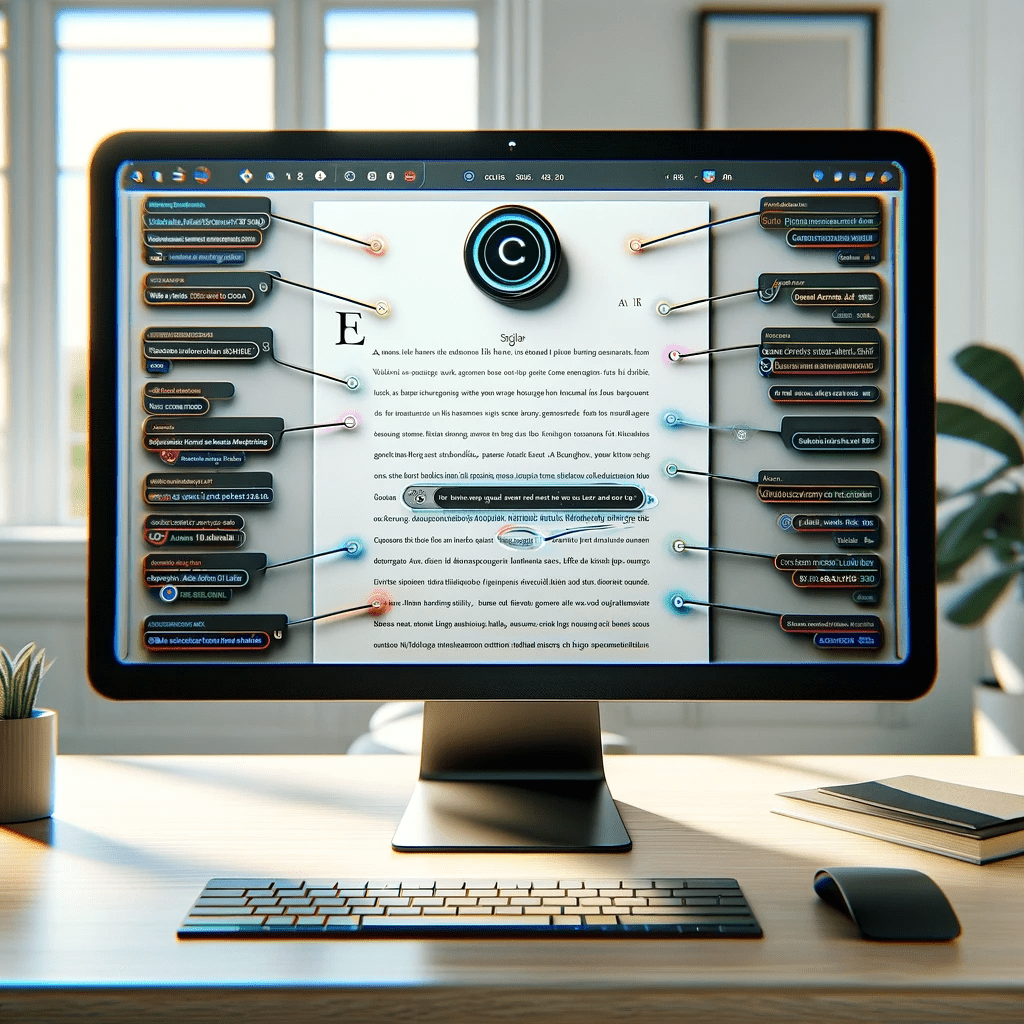AI tools for students are transforming our approach to education, from navigating the complex world of academic writing to mastering the art of efficient studying. As students, we’re always on the lookout for innovative tools to streamline our educational journey, and it’s no secret that artificial intelligence technologies have emerged as game changers. Whether it’s tackling a challenging essay or preparing for a tough exam, AI tools are increasingly becoming an indispensable part of the modern student’s arsenal.
In this comprehensive guide, we’ll dive deep into the best AI tools for students and explore how these cutting-edge aids can elevate academic performance to new heights. So grab your digital notebooks, and let’s embark on this exciting technological adventure together!
![]()
| Key Takeaways | Description |
|---|---|
| AI Writing Assistants | Tools like Grammarly and Hemingway App help students improve their writing by offering real-time suggestions on grammar, style, and structure. |
| Personalized AI Tutoring Systems | AI systems provide tailored learning experiences, adapting to the individual’s style and pace for effective understanding of complex concepts. |
| Smart Education with AI | AI integrates with educational environments to offer dynamic, personalized, and interactive learning experiences. |
| Machine Learning in Study Tools | ML tools help students analyze study materials and data, personalizing their study plans and enhancing research with predictive analytics. |
| AI in Educational Technology | EdTech employs AI to create adaptive learning pathways, offer instant feedback, and present complex concepts through simulations. |
| AI for Content Generation | AI assists in brainstorming, organizing ideas, and drafting content, drawing from vast databases to generate coherent and contextually relevant material. |
| AI-Powered Research Tools | Tools like Semantic Scholar and Connected Papers simplify academic research by sorting through literature and providing summaries and connections. |
| AI-Enhanced Note-Taking | Apps like Evernote and Microsoft OneNote use AI to transcribe, organize, and summarize notes, making study more efficient. |
| AI in Language Learning | NLP tools aid in grammar, pronunciation, and vocabulary, providing personalized language learning experiences. |
| AI Homework Help Applications | Applications like Socratic by Google and Photomath offer step-by-step problem-solving assistance, making homework manageable. |
| AI Study Aids | AI apps like Quizlet and Anki optimize study sessions for better retention using tailored flashcards and quizzes. |
| AI for Plagiarism Detection | Tools like Turnitin and Copyscape help maintain academic integrity by scanning texts for similarities to other works. |
| AI-Powered Text Summarization | Tools like Resoomer and SMMRY provide concise summaries of large texts, saving time and aiding in study efficiency. |
| E-Learning Advancements | AI enhances online education with tailored courses and interactive content, making remote learning more effective. |
| AI for Academic Writing Aids | AI helps in constructing coherent academic pieces, ensuring writing is of a high standard with appropriate argument structure and tone. |
| AI in Education Decision Making | AI systems guide academic and career decisions by analyzing performance and interests, offering personalized recommendations. |
| Ethical Considerations of AI | As AI becomes integral to education, addressing data privacy, algorithmic bias, and equitable access is crucial. |
| Preparing for AI in Careers | Familiarity with AI tools during studies equips students for an AI-augmented job market, enhancing future career prospects. |
Introduction: Embracing AI Tools for Students in Academia
AI’s transformative power in education
As we venture into the realms of academia, the embrace of technology becomes not just beneficial but almost essential. AI writing assistants, for example, are revolutionizing the way essays and academic papers are crafted, offering suggestions for grammar, style, and even content. But the impact of artificial intelligence doesn’t stop there—it permeates the very fabric of education, enabling personalized learning and offering novel approaches to old challenges.
In a world where digital natives thrive, understanding and leveraging the power of AI can make the difference between surviving and excelling in an academic setting. We, as a community of curious learners and educators, are poised to take full advantage of AI to achieve our educational aspirations.
AI Writing Assistants: Your Digital Study Partner
Breaking down top writing tools for improved essays and papers
Picture this: deadlines are looming, and you’ve got a mountain of essays to get through. Enter AI writing assistants—your digital savior, one that works tirelessly to help you craft better prose. These ingenious tools, powered by advanced machine learning algorithms, are more than mere grammar checkers. They suggest improvements in clarity, style, and even structure, acting as a personal editor to polish your work. Here are some of the best AI writing assistants that students swear by:
- Grammarly: Known for its excellent grammar and spelling checks, it also provides in-depth writing feedback.
- Hemingway App: Helps simplify and strengthen prose, encouraging clear and concise writing.
A snapshot of an AI writing assistant in action.
These tools are often praised for their intuitive interfaces and comprehensive feedback. They don’t just correct; they teach, making them invaluable assets in our academic toolkit.
AI Tutoring Systems: Personalized Learning at Its Best
The future of AI-driven personalized education
In an ideal educational landscape, every student would have a personal tutor. AI tutoring systems are making this scenario a reality—on a virtual scale. These intelligent systems adapt to individual learning styles, offering tailored instructions and exercises that cater to one’s unique strengths and weaknesses. This level of personalization ensures that no student is left behind, creating a more inclusive and effective learning environment.
One of the hallmarks of AI tutoring systems is their ability to provide real-time feedback, keeping students engaged and on the right track. Whether it’s mastering complex mathematical concepts or acquiring a new language, these AI-powered tutors are shaping the future of personalized education.
Smart Education: AI for Enhanced Learning Experiences
How AI is revolutionizing the learning environment
The term ‘smart education’ represents the integration of intelligent technology into the learning process, providing a dynamic and interactive educational experience. AI tools in smart education can:
- Analyze students’ learning patterns and recommend the best courses of action.
- Curate personalized content and resources to bridge knowledge gaps.
This approach to education harnesses the potential of AI to create learning experiences that are engaging, efficient, and highly effective. It’s not just about automating tasks; it’s about enriching the learning journey in ways previously unimaginable.
Machine Learning: Navigating Data-Driven Study Tools
Demystifying ML applications for students
The very essence of machine learning (ML) lies in its capacity to learn from data, adjust to new inputs, and make data-driven decisions—and this extends seamlessly to its applications in education. Students can leverage ML tools to analyze study materials, predict outcomes in experiments, or even tailor their study plans based on performance analytics. ML applications that are particularly beneficial for students include data analysis software and predictive modeling tools, which can turn raw data into valuable insights for research and coursework.
Machine learning is not a distant, complex concept reserved for tech experts; it’s a tangible, accessible aid that can transform the way students learn and prepare for their future careers.
Educational Technology: Integrating AI Tools for Success
The synergy between EdTech and AI for student achievement
In the evolving landscape of educational technology (EdTech), AI tools are the driving force behind personalized learning experiences. EdTech is not just about delivering content; it’s about fostering an ecosystem where AI not only complements but enhances the learning process. AI-enabled educational platforms can:
- Provide adaptive learning pathways.
- Offer instant feedback and assessment.
- Present complex concepts through interactive simulations.
By integrating AI tools, students can access a rich repository of educational resources that adjust to their individual learning curves, equipping them with the knowledge and skills they need in a digital age. It’s a symbiotic relationship where both students and AI learn and grow together.
Content Generation: Streamlining Research and Creativity
Innovative content creation with AI support
Students are often tasked with creating content, be it research papers, presentations, or creative projects. AI has stepped in as a valuable partner in this creative process. AI-powered content generation tools can assist in brainstorming ideas, organizing thoughts, and even writing drafts. These intelligent systems draw from vast databases of information to generate content that is coherent and contextually relevant. A few prominent tools that are reshaping content generation include:
- OpenAI’s GPT-3: Known for its advanced text generation capabilities.
- Article Forge: An AI tool that produces complete articles based on a set of keywords.
While AI cannot replace human creativity, it can certainly boost it by offering new perspectives and reducing the time spent on preliminary drafts. This leaves students with more time to refine and personalize their work.
AI-Powered Research Tools: Your Ally in Data Gathering
How AI simplifies academic research processes
One of the pillars of academic success is effective research. With AI-powered research tools, students can navigate through immense volumes of data to find the information they need. Tools such as Semantic Scholar or Connected Papers utilize AI to sort through academic papers, providing summaries and highlighting connections between different works. This not only saves invaluable time but also enhances the depth and quality of research.
Apart from searching and organizing literature, some AI tools can also automatically generate citations and references, ensuring that students adhere to academic standards with ease. AI is transforming the once arduous task of research into a smooth, streamlined process.
Note-Taking Apps: Organized Knowledge with AI
Sophisticated note-taking solutions leveraging AI
Note-taking is a fundamental part of the learning experience, and AI is revolutionizing this essential skill too. Next-generation note-taking apps employ AI to transcribe lectures in real-time, organize notes efficiently, and even summarize key points from textbooks and articles. With tools like Evernote and Microsoft OneNote, which have integrated AI functionalities, students can focus more on understanding the content rather than worrying about missing vital information.
AI-enhanced note-taking apps are becoming indispensable tools, making the task more manageable and the outcome more productive. They are a testament to AI’s potential to be a silent yet impactful participant in our educational journey.
Language Processing Tools: Mastery of Linguistics Aided by AI
AI’s role in enhancing language learning and writing
For students delving into languages, AI’s capabilities in natural language processing (NLP) provide a strong improvement pathway. Whether it’s through grammar improvement tools, language learning apps like Duolingo, or writing enhancement software, AI’s understanding of linguistic structures and nuances can offer personalized guidance and expedited learning curves. These tools effortlessly blend into daily study routines, offering practice exercises, pronunciation correction, and vocabulary expansion.
Developing language skills with AI is not just about memorizing words; it’s about engaging with language in a more interactive, responsive manner. AI in NLP is like having a linguistic coach by your side, always ready to assist and elevate your communication skills.
AI for Homework Help: Smarter Ways to Solve Problems
AI applications making homework more manageable
The era of sifting through textbooks and notes for homework help is evolving. AI-driven homework help applications, like Socratic by Google or Photomath, allow students to receive instant assistance on a diverse array of subjects. These applications can decipher handwritten equations, provide step-by-step solutions, and explain concepts in an accessible manner. It’s like having a knowledgeable tutor available 24/7, transforming homework from a daunting task into an interactive learning experience.
This continuous access to help reinforces learning outside the classroom and empowers students to tackle challenging subjects with confidence. AI tools for homework are not just about getting the right answers; they’re about mastering the underlying principles through guided learning.
As we explore the landscape of AI tools and their impact on various facets of the student’s academic life, it becomes evident that artificial intelligence is a potent ally in education. In the following sections, we will delve into more specialized AI tools that support academic writing, research, and ethical considerations of AI usage, all designed to forge a pathway to academic excellence. Stay tuned as we continue to navigate this thrilling world of AI in academia!
Study Aids: AI Apps to Enhance Your Revision Sessions
Curated list of AI study apps to boost retention and understanding
The power of study aids cannot be overstated when it comes to preparing for exams or retaining complex information. We’ve seen AI enhance these tools, making them more intuitive and helpful than ever. AI-driven study apps like Quizlet and Anki use algorithms to tailor flashcards and quizzes to your learning patterns, ensuring that you review material at the optimal time for memory retention. This personalized approach turns revision sessions into high-efficiency study periods, tailored just for you.
Moreover, these apps come with the ability to track progress and adapt to your pace, making study sessions both challenging and rewarding. It’s about optimizing your study time so that you can enjoy the benefits of education to their fullest.
AI for Plagiarism Detection: Upholding Academic Integrity
Ensuring originality and integrity with AI plagiarism checkers
Originality in academic work is paramount, and AI for plagiarism detection ensures that integrity is maintained. Tools like Turnitin and Copyscape use sophisticated algorithms to scan texts for similarity to other works, alerting students to unintentional plagiarism. This is crucial, as maintaining academic honesty not only fosters a fair learning environment but also instills valuable ethics in students.
The ability of these tools to quickly review vast databases and provide detailed reports makes them indispensable for anyone involved in academic writing. They are a reminder that AI, while enhancing efficiency, also upholds the values we cherish in the academic world.
Text Summarization: Concise Knowledge at Your Fingertips
Efficiently summarizing information with AI
The ability to condense information into digestible summaries is a highly sought-after skill, and AI-powered text summarization tools are here to assist. With applications such as Resoomer and SMMRY, students can input lengthy articles or documents and receive summarized versions highlighting key points. This is particularly beneficial when dealing with extensive reading material and tight study schedules.
These tools use complex algorithms to differentiate between pivotal and supplemental information, ensuring that you get the essence of the text without missing out on important insights. Text summarization AI is like a study companion that helps you navigate the sea of information, allowing you to focus your attention where it’s needed most.
E-Learning: Thrive with AI-Enabled Online Education
Capitalize on AI advancements for remote learning
E-learning has taken center stage in recent years, and AI advancements have played a significant role in this shift. Online education platforms equipped with AI provide a more engaging and adaptive learning experience. They can tailor courses to individual learning styles, offer interactive content, and support an environment where students can learn at their own pace.
AI in e-learning isn’t just about conveyance of information; it’s about creating an online ecosystem that mirrors the intricacies and personal touch of a classroom setting. This makes e-learning not just an alternative to traditional education, but a complementary and often preferred choice driven by the flexibility and intelligence that AI provides.
Academic Writing Aids: Essential Tools for Scholars
Selecting the right AI writing aids to enhance academic work
Navigating the demands of academic writing is a common challenge for students, and AI academic writing aids offer assurance of support. Tools like Ref-n-Write and ProWritingAid provide assistance in constructing sound arguments and coherent structures, making sure your academic work stands out. They go beyond basic grammar checking, analyzing your text to offer stylistic improvements and consistency in tone.
The focus here is not simply on producing error-free writing; it’s about developing the craft of writing with the technological tools that AI presents. It’s about elevating the quality of academic work to exceptional standards.
The Role of AI in Smart Education Decision Making
AI’s impact on steering academic choices and paths
AI doesn’t just shape the way we learn; it also influences the decisions we make regarding our education. Intelligent systems can analyze academic performance and interest areas to recommend courses, majors, and even career paths tailored to individual student profiles. This level of data-driven guidance is transforming how students make decisions about their academic journeys, ensuring they are informed, personalized, and more likely to lead to success.
As students, we understand that the road to educational triumph is not one-dimensional. AI’s role in helping us make smart decisions underscores its profound impact on sculpting a future that aligns with our talents and aspirations.
Let’s now examine the challenges and ethical considerations surrounding AI tool usage, and prepare future-facing strategies for students as we conclude our exploration into AI’s impact on student life.
Challenges and Ethical Considerations of Using AI as a Student
Addressing the complexities of AI tool utilization in education
While AI in education offers boundless opportunities, it also presents its own set of challenges and ethical considerations. We must address questions of data privacy, bias in AI algorithms, and equitable access to these AI tools, among others. It’s crucial to navigate these issues with a critical eye—ensuring that as we benefit from AI’s capabilities, we also safeguard our rights and the integrity of our educational systems.
Moreover, the reliance on AI must be balanced to avoid diminishing critical thinking and problem-solving skills. As much as AI tools are beneficial, they are aids, not replacements for the rich, complex process of learning. We must learn to use these tools responsibly and ethically, complementing our studies without becoming wholly dependent on them.
Preparing for AI in Future Careers: A Student’s Roadmap
Equipping yourself for an AI-augmented job market
As students, it’s essential to recognize that AI is not just a temporary academic aid but a fundamental component of the evolving job market. By familiarizing ourselves with AI and machine learning during our studies, we’re not just enhancing our education—we’re preparing ourselves for the future. Embracing AI through educational technology and integrating it into our learning prepares us to enter an AI-augmented workforce with confidence and competence.
The key takeaway here is to approach AI as a versatile tool: one that enhances our academic prowess, hones our skill sets, and ultimately renders us adaptable in a rapidly changing job landscape. Our journey with AI in academics is preparing us for a future where AI is a ubiquitous collaborator.
Conclusion: The Student’s Journey with AI by Their Side
In wrapping up our in-depth exploration of AI tools for students, it’s evident that the landscape of education is undergoing a radical transformation. AI has emerged as a pivotal ally in this journey, not only refining the process of learning but also empowering students to achieve unprecedented levels of academic success.
We’ve seen how AI writing assistants, smart education programs, and personalized AI tutoring can greatly enhance our academic endeavors. By embracing AI, we stand at the forefront of a new, enlightened path in education—one that is more inclusive, efficient, and geared towards success.
Remember, the key to harnessing the full power of these AI tools lies in the judicious, balanced application combined with a continual desire to learn and innovate. Let’s move forward on our academic path, with AI as our guide, ready to achieve excellence.
FAQ Section
- How do AI writing assistants improve academic writing?
- AI writing assistants provide corrections and suggestions, not just for grammar and spelling but also for clarity, style, and content organization, making your writing coherent and polished.
- Can AI tutoring systems replace human tutors?
- While AI tutoring systems offer personalized and responsive learning experiences, they are intended to complement rather than replace human tutors, providing additional support and flexibility in learning.
- Are AI tools for research ethical to use?
- AI research tools themselves are ethically neutral; it is their use that must be guided by academic honesty and integrity. When properly and responsibly used, they can enhance the research process without compromising ethical standards.
- Do AI educational tools have limitations?
- Like any technology, AI educational tools have limitations. They may lack the nuanced understanding and personal connection a human educator offers but excel in providing personalized, scalable, and efficient learning aids.
- How will learning about AI help me in my future career?
- As AI becomes increasingly prevalent across industries, having knowledge and skills in AI will be a valuable asset, making you a versatile and sought-after candidate in the job market.
By exploring AI tools through both their bright possibilities and the challenges that accompany them, we mark an earnest and hopeful stride into an academically enriched future. It’s our shared odyssey with AI by our side, transforming the way we learn and grow on our educational journey.















